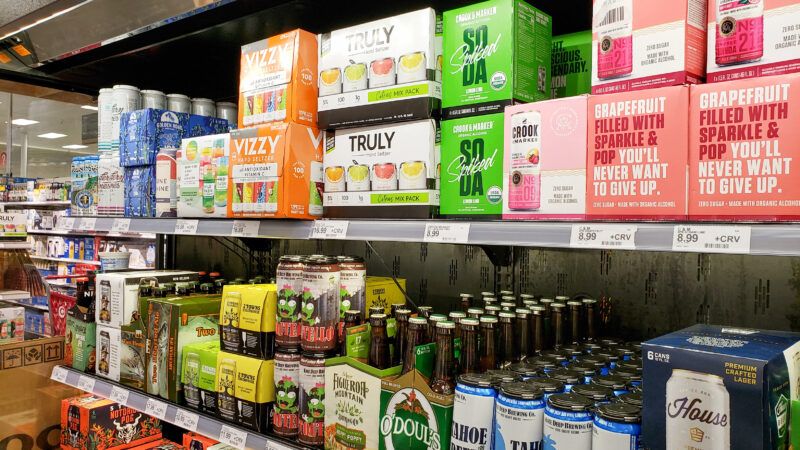Consumer Groups Ask FDA To Force Alcohol Makers To Hide Facts from Consumers
Knowledge is probably not more dangerous than alcohol, but why risk it?

Last week, the Center for Science in the Public Interest (CSPI) and the Consumer Federation of America (CFA) sent a letter to the Food and Drug Administration (FDA) that urges the agency to crack down on a popular hard seltzer because the labeling tells consumers something we apparently can't handle: the truth.
The hard seltzer in question, Vizzy, is produced by beer giant Molson Coors. Vizzy markets its product line, which contains added vitamin C, with labeling that touts the fact it contains… added vitamin C. But CSPI and CFA say Vizzy shouldn't be allowed to share truthful information about the addition of vitamin C with consumers because, well, alcohol is bad.
In the groups' joint letter to Susan Mayne, Director of the FDA's Center for Food Safety and Applied Nutrition, CSPI and CFA ask the FDA to "take immediate enforcement action" against Vizzy and to issue a formal policy to "prohibit nutrient content claims on alcohol[] beverages," including Vizzy and its competitors.
Notably, nowhere in their letter do CSPI and CFA claim the information Vizzy provides to consumers is false. Rather, with a flourish of Orwellian denialism, they claim the truthful information Vizzy provides consumers somehow serves to mislead those same consumers.
To bolster their argument, CSPI and CFA cite a nonbinding 2015 FDA guidance document that states the agency "do[es] not consider it appropriate to add vitamins and minerals to alcoholic beverages." Notably, the FDA also opposes similarly fortifying a host of other foods, including candy. The guidance document claims adding vitamins or minerals to such foods and beverages "would disrupt public understanding about the nutritional value of individual foods and thereby promote confusion among consumers, making it more difficult for them to construct diets that are nutritionally adequate."
The assumption that an alcohol beverage cannot and should not be at all nutritious is baked into CSPI's and CFA's position: "all alcoholic drinks provide empty calories."
"You should get your vitamins from foods first, and a multivitamin or supplement as a distant second if you really need it," said Eva Greenthal, CSPI senior science policy associate, in a statement. "Alcoholic beverages are the absolute last place where you should go looking for or expect to find vitamins. The presence of vitamin C in hard seltzer is no reason to drink more than you would otherwise and doesn't make this brand of hard seltzer less damaging to your health than any other."
I doubt very sincerely that the addition of "antioxidant Vitamin C from acerola superfruit" makes Vizzy hard seltzer any more or less healthy to drink, or any more or less healthy than other hard seltzers, including, for example, this certified-organic option. But I also fail to understand how drinking one 100-calorie can of hard seltzer that clocks in at just 5% alcohol by volume is "damaging to your health." After all, the fact many experts believe moderate alcohol consumption can have health benefits isn't exactly a secret.
What's more, as a class of alcohol beverages, hard seltzers typically contain less alcohol and fewer calories than drinks such as beer and wine. Consumers who choose hard seltzer know this and are drawn to these beverages for those reasons. Indeed, a big part of hard seltzer's appeal is consumers' growing "preference for low-alcohol beverages."
I'm one such consumer. For the past decade or so I've mixed equal parts sparkling mineral water and white wine (usually a New Zealand-made Sauvignon Blanc) when I drink at home with meals. (If you believe this is a wine spritzer, you are wrong.) The minerals, light carbonation, and lower alcohol of this mix appeal to me. I also sometimes drink canned hard seltzers for some of those same reasons. San Juan Seltzer, produced in Seattle with local fruits such as Rainier cherries and boasting just 85 calories, no sugar or carbs, and 4% alcohol, is a perfect drink for Seattle's fleeting summers.
Of course, I'm not a nutritionist, medical doctor, nor paid spokesmodel. I'm not urging you to drink alcohol. Neither am I urging you to avoid it. If you're an adult, that choice is and should be yours and yours alone.
By providing consumers with truthful information that distinguishes their products from those of their competitors, companies such as Molson Coors help consumers make more informed choices. The FDA shouldn't prohibit Vizzy, other hard seltzer makers, or any other food or beverage maker from sharing truthful information about its products with consumers. No matter what some "consumer" groups say.


Show Comments (130)